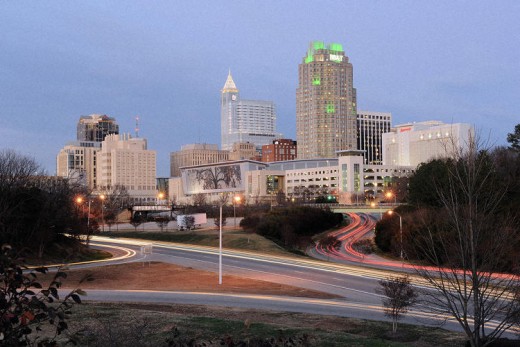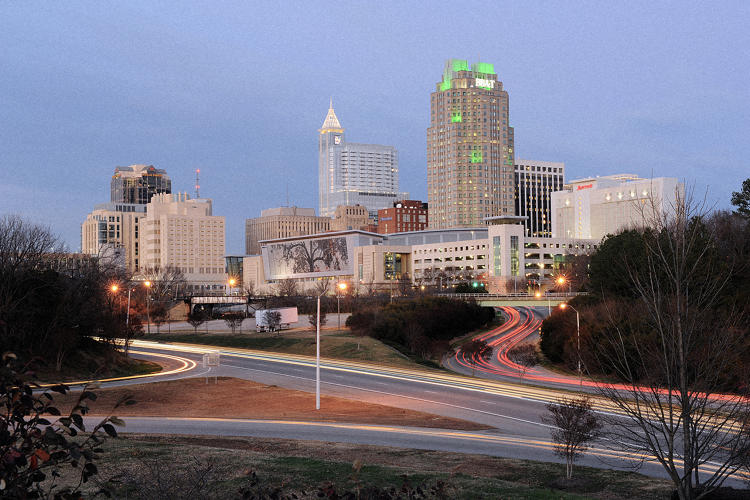The Top 25 U.S. Cities For Jobs This Year
Glassdoor’s latest survey reveals the cities where workers are most satisfied (and can afford to buy the things that make them happy).
A lot of factors go into finding the right job, and like many things in life, location plays a huge role. And while the coasts have long been considered industry hotspots, the best cities for jobs might surprise you.
According to Glassdoor’s Best Cities for Jobs report, the top three are Raleigh, North Carolina; Kansas City, Missouri; and Oklahoma City, Oklahoma, based on a comparison of the 50 most populated U.S. metro areas.
Part of the reason Raleigh placed first is a matter of practicality. “Raleigh has long held a reputation for tech companies looking to flee the expensive and congested Northeast corridor, with companies like IBM, Cisco, and SAS setting up shop in North Carolina,” Glassdoor’s chief economist Andrew Chamberlain tells Fast Company.
But unlike Glassdoor’s previous survey that measured the best cities by employee satisfaction, each region’s Glassdoor Job Score, based on a five-point scale (five being the best), is determined by measuring three factors equally.
- Hiring opportunity: Determined by the ratio of active job openings to population data according to the U.S. Office of Management & Budget.
- Cost of living: Determined by the ratio of median annual base salary as reported by local employees over the past year to median metro home value, according to the most recent Zillow Home Value Index for All Homes.
- Job satisfaction: Determined by a minimum of 1,000 company reviews shared by local employees on Glassdoor over the past year.
Chamberlain says these other factors contributed to Raleigh snagging the top spot. Situated in the “Research Triangle,” it has several universities feeding skilled workers to employers. “Couple this with Raleigh’s walkable neighborhoods and affordable homes, and it’s no surprise that Raleigh stands out as the best city for jobs,” Chamberlain states.
What Job Seekers Really Want
Chamberlain says it’s not just Raleigh that scores points for what job seekers really want: a stable career that they’re happy with, and the feeling that they can “get ahead” and eventually own a home.
“We see this taking place in fast-growing, mid-sized tech magnets like Austin and Seattle, which have benefitted tremendously from the tech boom as an alternative to high-cost tech hubs such as San Francisco, Boston, and New York City,” he notes.
Job seekers are also being pulled towards cities like Kansas City and Louisville that boast a stable middle-class and affordable, family-friendly neighborhoods, Chamberlain says. “While these cities may not have scorching tech job growth, they make up for it with low housing costs compared to paychecks and affordable middle-class neighborhoods,” he adds.
That’s part of the problem with cities such as San Jose, which took top honors in last year’s employee satisfaction survey. “San Jose has a very active job market and satisfied employees, ranking first for hiring opportunity and second for job satisfaction,” explains Chamberlain. “However, San Jose’s overall Glassdoor Job Score was significantly weighed down by the affordability factor, coming in at #46 for cost of living.”
Being able to earn enough to buy the things that make you happy, whether your own home, or the ability to take vacations, is what workers really want, according to a . And as the same survey revealed, salary raises are sluggish even though the cost of living is rising, making affordable cities magnets for job seekers who want to stretch their paychecks further than a trip to the grocery and a month’s rent.
Is Reinvention Necessary?
Unfortunately, says Chamberlain, less well-known metro areas are faced with a perception problem. “The dramatic transformation of America’s mid-sized cities hasn’t kept up with public perception of where the best places for work really are,” he explains.
While techies still clamor to claim a spot in San Francisco and finance workers flock to New York City (neither of which made it into the top ten on the list of 25 cities), it’s a tougher sell to get them to consider Louisville, Kentucky (#8), Columbus, Ohio (#13), and the like.
“Many cities on this list offer great economic value for job seekers but are facing a roadblock with branding,” says Chamberlain. Part of that is the lack of a fat paycheck that would be standard in bigger metros. But Chamberlain says even though salaries are lower, that’s countered by affordable housing options and vibrant job markets in which people can get hired, then advance their careers.
Says Chamberlain: “A key takeaway for job seekers is that a bigger city doesn’t always mean better when it comes to finding a job, being satisfied in that job, and affording a mortgage.”
Here’s a list of the top 25 cities along with how they compare by factor: hiring opportunity, cost of living, and job satisfaction. It also goes beyond the Top 25, comparing how the 50 most populous cities compare for these same factors:
Fast Company , Read Full Story
(166)














